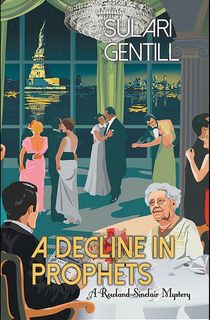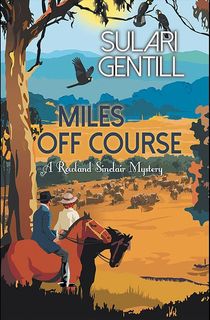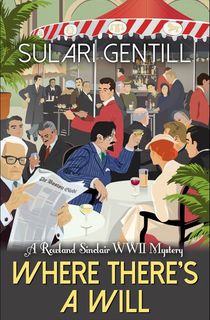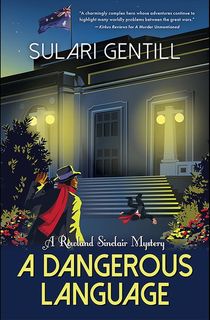For fans of traditional mysteries and meta-mysteries, Sulari Gentill is the perfect writer for you. Based in Australia, she writes the delightful Rowland Sinclair series, which takes place in 1930s Australia. She also writes meta-mysteries that play with the structure and form of murder mysteries, notably in Crossing the Lines (US title After She Wrote Him) and most recently published The Woman in the Library. Murder & Mayhem had a chance to talk with Gentill about her work.
*This interview has been edited for length and clarity.
Murder & Mayhem: How did you get into mysteries?
I think I first fell in love with storytelling when I was a child. My father would tell stories, like the stories that were written into the constellations. We'd go out at night, and he'd look up at the night sky, and he would point out Orion, and tell us the story of Orion the Giant. That was why I was confused enough to think I wanted to be an astrophysicist. I thought, “Oh, the night sky is wonderful.” I realized later on, when I went to university to study it, that I'd fallen in love with stories that my father had told about the night sky, as opposed to the stars themselves. So I have been writing in that genre perfectly happily.

A Few Right Thinking Men
It was actually my husband who just suggested it one day; I have another series that's mainly for young adults called the Hero Trilogy that was released in Australia, but not in the US. I wouldn't have said that I was an expert in the genre at all. But I just started writing.
So somehow over the years, reading and watching television and movies, I have absorbed the form of crime writing. It seemed like a very natural way to write. The wonderful thing about mystery is that it allows you to give your characters something to do. You don't have to come up with some artificial contrived reason for them to be in the same room, they are investigating a murder.

A Decline in Prophets
How did you go from writing your traditional mystery series to more meta-mystery ones?
I love traditional mystery. I love the conversations I can have about politics, and race, and prejudice within the framework of a traditional murder mystery. Part of that is because people know what to expect with the way the plot goes. You can actually load them up with other themes and other ideas, because it doesn't take a lot of effort to follow the plot.
Related: 15 Must-Read Mysteries and Thrillers by Diverse Authors

Miles Off Course
But after several years of writing in that genre, I feel the need to push the envelope and to write something that's truly novel. I suppose that's where Crossing the Lines and The Woman in the Library came from. It's my need to actually do something in a way that nobody else has done before. Now, you can't be sure that that is that nobody else has ever written a book like those two before, but I haven't read them.
I did want to actually twist not just the plot, but the structure of the novel itself. I also quite love removing that fourth wall and talking directly to the reader. So what metafiction is is the ability to say to the reader, “Let's talk about the fact that this is a story.”

After She Wrote Him
How did The Woman in the Library come about?
The first part of this story is very meta in its own way. I was writing the tenth Rowland Sinclair novel, which is set in Boston. The reason is that American readers embraced that series and I felt really surprised and grateful, because the series is not set in the US. I wanted to write the 10th novel in America, almost as a thank you and a nod to American readers.
Related: 12 Mystery Books from Around the World
But the problem was that this was 2019 when I was writing that book. I hadn't been to America in years and I had never been to Boston. So I had a problem. But I had a friend who was in Boston at the time and he was writing his own novel. I wrote a letter and I said, “Can I pick your brain while you're there, so that I can get the elements of place right for this novel?” Because crime fiction traditionally has a very strong sense of place.

Where There's a Will
So we started, but the problem is that Larry's a much, much better researcher than I am. I tend to sort of sketch things and he does an oil painting. So not only would he answer my question, but he would also send me maps, menus, and weather reports.
Then one day, there was a murder a couple blocks from where he was staying. And he thought “Sulari is a mystery writer, it might be useful for her to know what an American crime scene looks like.” So he took himself off down to the crime scene after the body had been removed and he took footage of the crime scene.
So this email comes in from Larry with a movie file attachment and it opens up to a crime scene. My husband happened to be standing behind me at the time and he said, “Gee, I hope Larry's not killing people so he can send your research.” He certainly wasn't. But it did strike me as a really interesting idea for a novel. Of course, I didn't cast Larry as a psychopath without knowing. I told him what I was doing.

A Dangerous Language
Do you find that your interest in astrophysics or practicing law has impacted your writing in any way?
The thing I'd say that's impacted my life is in the year I was studying astrophysics; it was pure mathematics. I found when I was writing, I'm what they call a “pantser” in Australia. I don't plot at all; I just sit down and I write. That seems like an unusual thing to do in crime fiction, where there's so many threads and there's red herrings. I think the reason I can do that is because I was trained in pure mathematics. So the logic of mathematics fits very well with a thread in crime fiction.

The Woman in the Library
Thank you to Sulari Gentill for a wonderful interview and delightful books!


